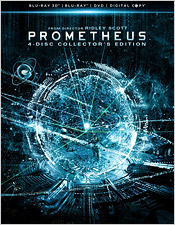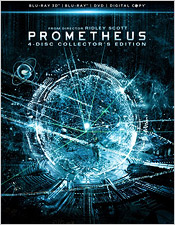Prometheus: 4-Disc Collector’s Edition (Blu-ray Review)

Director
Ridley ScottRelease Date(s)
2012 (October 9, 2012)Studio(s)
Scott Free/Brandywine (20th Century Fox)Technical Specifications
Note: This edition includes Blu-ray 3D, Blu-ray and DVD/Digital Copy discs, plus an exclusive Blu-ray Bonus Disc
- Film/Program Grade: C-
- Video Grade: A+
- Audio Grade: A
- Extras Grade: A+
Review
[Editor’s Note: This review contains significant spoilers. Read on – or not – accordingly.]
Few films in recent memory have stirred as much anticipation, controversy and debate in the geek community as Ridley Scott’s Prometheus – something that comes as no surprise given that the film represents Scott’s long-awaited return to cinematic science fiction following a thirty year absence after the release of his original Alien (1979) and Blade Runner (1982), both landmarks of the genre.
The story follows a pair of young archaeologists in the year 2089, Elizabeth Shaw (Noomi Rapace) and Charlie Holloway (Logan Marshall-Green), who discover a mysterious star map common to the excavated ruins of otherwise unrelated ancient human civilizations. This they believe to be an invitation left by an advanced alien race – so-called Engineers who may have created the human race. Hired by the industrialist Peter Weyland (Guy Pearce in old age makeup), Shaw and Holloway lead a scientific expedition aboard the spacecraft Prometheus to the planet indicated in the map – the moon LV-223 in the Zeta 2 Reticuli system. Also aboard Prometheus along with its crew are the android David (a terrific performance by Michael Fassbender) and an icy Weyland company watchdog (played Charlize Theron). Upon landing on LV-223, the crew finds not only the ruins of an ancient Engineer base but the desiccated corpses of the Engineers themselves. As they grapple with these discoveries, David begins to reveal a hidden agenda as well as the cause of the Engineers’ demise – a devastating primordial lifeform that could wipe out the expedition… and all life on Earth.
Originally conceived as a straightforward prequel to Alien, Scott’s Prometheus continued to evolve throughout not just the writing phase but the entire filmmaking process into something very different – a film with clear ties to the Alien franchise but which obsessively strives to break new ground. Scott and his writers were pushing at every step to introduce Grand Ideas into this universe, and many of them are interesting indeed. But in their effort to think big, they unfortunately seem to have lost sight of many of the more mundane details of the story actually told on screen – the choices and actions of the film’s characters that all too often defy basic logic and common sense.
Here’s just one example: If this mission literally meant the difference between life and death for Weyland, why wouldn’t he staff it with the absolute best scientists, technicians and engineers his money could buy? Why does he instead crew the ship with knuckle-headed hired hands just working for a paycheck? To illustrate this another way, imagine the terminally-ill Steve Jobs had had access to faster-than-light space travel and near-miraculous technology, and had learned that an alien race (that quite possibly created Humanity and would certainly have the ability to cure his cancer) had left an invitation to come visit? Do you think he’d have settled for a bunch of space truckers or would he have wisely staffed his crew with the best of the best – the cream of the crop of Nobel laureates, NASA astronauts and the like? This is key, because the buffoonish crew that Weyland selects clumsily proceeds to poke everything in sight, contaminate themselves and their spacecraft, and pretty much make a mockery of their entire mission. There are a whole series of baffling questions that arise from this: Why does the geologist and map-maker (who has the controls/readout of the mapping devices right on the sleeve of his spacesuit) get lost? Why is the exobiologist so afraid of the Engineer corpse that he runs away but has no problem poking his fingers at the clearly very alive and dangerous looking cobra alien a short time later? What kind of scientist (I'm referring to Holloway) takes the risk of removing his helmet to contaminate both himself and the alien environment around him, then doesn’t care after subsequently making what are certainly the biggest discoveries in the history of science? Why would anyone certified for space travel burn pot in their spacesuit’s oxygen supply? Why are there flamethrowers on a space expedition? (Here’s a hint for those who many not be aware – fire and space travel really don’t mix.) Why doesn’t Vickers just run perpendicular to the direction that the crashing Derelict is rolling to avoid getting crushed? The list of dumb character choices in this film is huge. And that’s only the beginning of the problems here. Why does the Derelict ship crash in exactly the same position as the one from the original film, when they’re not meant to be on the same planet? (The answer turns out to be: They were meant to be the same planet... until they weren't. Ridley changed it in post-production at the 11th hour, as his crew members reveal in interview material on Disc Three.)
For all its ambitions, Prometheus feels far too bloated and over-produced to do justice to the original Alien. Unlike that film or Scott’s Blade Runner, where the limitations in visual effects technology at the time forced Scott to point his camera on an entirely real environment, here he makes here the same mistake George Lucas did in Episode I – he just shows you too much and enhances every corner of the frame with CG detail. Too many of the Grand Ideas presented in this film are heavy-handed – they’re given away, rather than letting the audience discover them organically. (Naming the film and the ship Prometheus?) At every stage, this film was just over-worked to the point that the purity, edginess and effectiveness of the original idea was lost. You can hear this in the writer’s commentary track, you can see it in the film’s conceptual design artwork. The creatures in the original film were nasty, deeply-unsettling, original and barely seen. Here (with the sole exception of the Engineers) they’re squishy, squidy derivations of the monsters from any bad Alien clone, from Galaxy of Terror to your typical Japanese Hentai film, and they're right out there in the light so you see every slimy tenticle.
Early in his career, Ridley Scott was so far ahead of the competition in terms of realizing believable science-fiction worlds that he set the gold standard. In the intervening years, a new generation of filmmakers have not only followed his lead, they’ve broken new ground. Could it be that Scott is now caught behind-the curve? Will we one day look back at Prometheus as Scott’s Full Metal Jacket moment? I certainly hope not, especially with his Blade Runner prequel already in development. Nevertheless, Prometheus is a high-concept, gorgeous looking mess – a film that somehow manages to be extraordinary smart and incredibly klutzy at the same time.
Thankfully, the video quality of Fox’s 2D Blu-ray version is spectacular. This is certainly home theatre reference material. Detail is refined and abundant – note the various holographic displays and the subtle textures of rock and sand on the planet’s surface. Color is quite vibrant and accurate to the theatrical presentation. Contrast is very pleasing as well, with deep, true blacks in the space scenes and nicely detailed shadows – for example in the interiors of the Engineer structure. The brightest areas of the picture are bright but never blown out. The film’s high-definition video representation is every bit the visual eye-candy it’s intended to be. The Blu-ray 3D presentation is excellent too, comparing in quality quite nicely with Fox’s Avatar in 3D – more on that soon in a separate review.
Sonically, the Blu-ray’s DTS-HD MA 7.1 audio presentation quality matches the visuals well. Clarity of dialogue is excellent at all times. Imaging is precise, and the surrounds are used to full effect in creating a sense of full immersion in the “story” space. This is a highly atmospheric mix and yet when the soundtrack needs to really pummel you with a wall of sound and thunderous sonic effects – such as when the Derelict crashes, for example – you’ll not want for bass, volume or clarity. The BD’s soundtrack supports the visuals perfectly. This is pure demo material.
Happily, the special features collected in this set are first-rate too. Produced by longtime Scott collaborator Charles de Lauzirika, they amount to arguably the largest batch of extras ever created for a single new release film. Let’s break down the set’s extras disc by disc…



